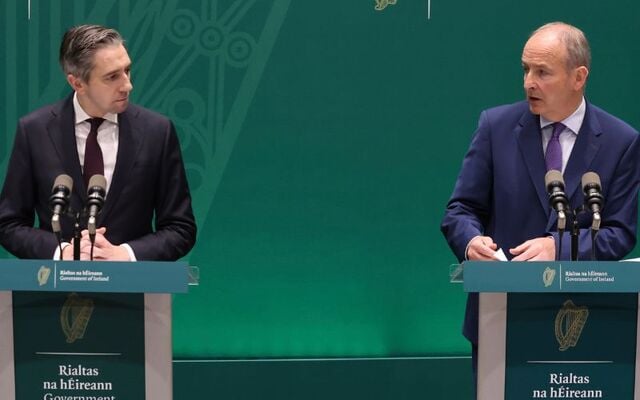A divide has emerged between Micheál Martin and Simon Harris on the US bombing of Iranian nuclear sites, with the Taoiseach failing to back his Foreign Affairs Minister – who yesterday said "there are international laws that say you shouldn’t do this."
Over the weekend, US President Donald Trump confirmed the strikes had caused "monumental damage," adding in a social media post: "Obliteration is an accurate term."
The US attacked three key Iranian nuclear facilities early on Sunday, local time.
Speaking in Brussels yesterday ahead of a meeting of the European Foreign Affairs Council, Minister Harris said of the ongoing dangers in the region and the attacks by the US over the weekend: "I’m very clear in relation to international law around attacks on nuclear installations.
"There are international laws that say you shouldn’t do this.
"I’m also very clear…that actually the actions of the United States added a significant level of danger to an already volatile situation. So it was a very unhelpful intervention."
He added: ‘While there will be, I’m sure, different views and different perspectives, the reality is… to make progress in relation to this, to stop an already tinderbox-type situation getting even worse, is to get back to a negotiated situation."
Referring to the US bombing of Iranian nuclear sites, he continued: "It has added a huge layer of extra volatility and danger.
"But what we now need to see is no further escalation of measures, and that really has to be where the focus of the European Union has to be on."
Speaking before Iran launched its own strikes against a US airbase in Qatar yesterday, Mr. Harris said that there was a "real risk" of the conflict between Iran and Israel "spilling over and broadening, and all control of it being lost."
He added: "This is an important point to remember that while we’ve seen in the past, you know, the nuclear deal with Iran and the likes that was imperfect, it certainly yielded much more in terms of any level of military aggression.
"The only way forward in relation to this situation will be a diplomatic negotiation solution.
"Nobody in the European Union wants to see Iran with a nuclear weapon, but we know the way to best keep people safe in the world, to best ensure that never happens in relation to Iran, is through a negotiated settlement."
However, the Taoiseach declined to back up the comments made by the Tánaiste when queried on the matter later in the day.
Asked by Extra.ie if he agreed with the Tánaiste’s comments, Mr. Martin said: "Ireland is multi-lateralist.
"We believe in international rules-based order, and in that sense, we would have preferred the dialogue and diplomacy in this in relation to the nuclear issue in Iran [had continued]. ‘And this has been an issue for quite a number of decades now."
He continued: "Iran has been a malign actor in the Middle East for quite some time.
"It even got involved in the Ukraine war by providing drones and so forth. But in particular, its support of Hamas, Hezbollah, the Houthis, its declaration of its position of destroying Israel, openly declared, makes for a very complex scenario in the Middle East.
"And the issue around Iran disavowing its intentions to have nuclear weapons or to build a nuclear weapon is something that has bedevilled international diplomacy for quite a long time."
The Taoiseach said that "it’s our view that those efforts should have been exhausted with Iran and the international community," adding: "What is required now is a complete de-escalation, an ending of the war."
Pressed by Extra.ie whether or not he believed the US had broken international law, as suggested by the Foreign Affairs Minister earlier in the day, he would only say: "I’ve given my position in relation to that."
*This article was originally published on Extra.ie.




Comments